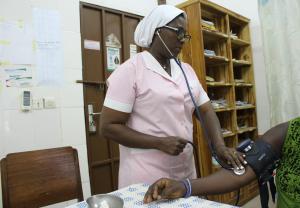Curbing maternal mortality in Côte d'Ivoire
Botro – It is vaccination day, baby cries fill the courtyard of the Botro General Hospital, about 400 kilometres north of Abidjan. Henriette Ouattara, who gave birth a few months ago at the maternity hospital in Botro, has come to have her baby vaccinated.
From prenatal consultation to delivery, Ouattara recalls, a dedicated and caring staff attended to her.
“On the day of delivery, if the midwife could push in my place, she would have done it,” she jokes, recalling the kindness of the head midwife who had assisted her. “The delivery went well because the midwife encouraged me a lot.”
Praise for the staff of the Botro maternity hospital is welcome news for the organizations behind an initiative set up to help reduce maternal mortality in the Gbêkê health region in central Cote d’Ivoire by improving the quality of reproductive, maternal and neonatal care.
In a country with a maternal mortality ratio of 385 deaths per 100 000 live births, the goal is specifically to end preventable maternal deaths related to postpartum haemorrhage, eclampsia, convulsive crisis induced by increased blood pressure, and abortion-related complications in this health region of Côte d'Ivoire.
The initiative was developed following an analysis of maternal morbidity and mortality using the World Health Organization (WHO) conceptual framework for quality of care, which is based on strengthening health systems. The results of the analysis show that 77 women died in 2020 – two more than the previous year – from pregnancy- or childbirth-related complications in the Gbêkê health region. Most of the deaths were avoidable, however.
The situation of Gbêkê is not exceptional on the continent. According to the Atlas of Health Statistics 2022 in the African Region, sub-Saharan Africa has 525 deaths per 100 000 live births and 27 neonatal deaths per 1000 live births. The report indicates that the region will continue to have 390 maternal deaths per 100 000 live births through 2030, far below the Sustainable Development Goal health target of 70 deaths per 100 000 live births. Among the factors contributing to these deaths is a shortage of skilled health personnel, which contributes to the low rate of births attended by skilled personnel.
With technical support from WHO and financial support from the Government of Sweden, 181 midwives from 18 health facilities in the Gbêkê have received training to strengthen their key life-saving clinical skills, including management of the third phase of delivery, which is critical for women's lives during childbirth.
“Through coaching and support sessions, these midwives have become able to properly practice (the third phase of delivery), which plays an important role in reducing immediate postpartum haemorrhage,” explains Chantal Tiwa Yewo, maternal health focal point for the Gbêkê health region.
Data from 15 of the 18 health centres enrolled indicates a gradual improvement in the quality of preventive and treatment care of more than 15% in six months, from 43.5% to 59.3%.
Recommended practices include planning delivery and obstetric complications during antenatal care, identifying risk factors for postpartum haemorrhage or eclampsia, creating and posting clinical guidelines, creating a fast-track to manage patients with obstetric complication, and placing an emergency toolkit in the delivery room.
“We didn't know we needed an emergency kit at the maternity ward, but now that we have one, it has saved lives,” says senior midwife Edwige Awo Kouadio, who is among the trained staff at the Sokoura urban health centre. “In the case of haemorrhage, they taught us how to use intrauterine balloon tamponades. We did practice runs with the team so that when we have complicated cases, we can remain calm and administer care properly without panicking.”
Since the beginning of 2022, six regional care quality improvement teams have been working each month in health centres to support the maintenance of essential reproductive and maternal health services in a post-COVID-19 context. Dr Pierre Zaelei Doh welcomes the progress made in the management of abortion-related complications.
“Since the start of this initiative, we have not had any fatal cases due to abortion-related complications. We’ve made tremendous progress.”
“The Gbêkê initiative contributes to achieving universal health coverage. We want every woman everywhere in Côte d'Ivoire to have access to quality and affordable care,” affirms Dr Jean-Marie Vianny Yameogo, WHO Representative in Côte d'Ivoire.
Mobile : 00225 07 57 06 07 65
E-mail : ntakpey [at] who.int (ntakpey[at]who[dot]int)
Communications Officer
Regional Office for Africa
Email: lawsonagbluluf [at] who.int (lawsonagbluluf[at]who[dot]int)



